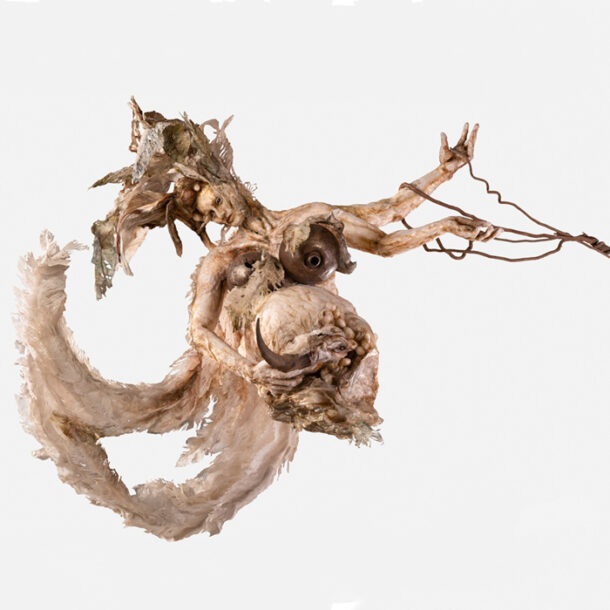
Hamzianpour & Kia is proud to welcome Iranian artist Elham Fallahi to our roster with the exhibition titled Rastaakhiz, a selection of works created in the last four years. This will be Fallahi’s first solo show outside Iran. The exhibition will be on view from February 11 through March 4, 2023.
Using reclaimed and found materials, Elham Fallahi creates ethereal sculptures that are inspired by the mythologies of Iran and other cultures. With each piece she weaves a narrative that simultaneously immerses viewers in the specific scene and takes them beyond it, to the larger story and the meanings embedded therein. She sources the materials during her own rovings, and through an ongoing collaboration with a large and growing number of families and galleries who provide her with their recyclable objects. Over time Fallahi has refined her technique and become masterful in manipulating and transmogrifying plastics. She has also added found natural materials including tree branches, horn, and shell.
Through her choice of materials Fallahi aims to foster awareness about the environmental and ecological effects of what she calls ‘the savagery of modern humans’. Though humanity is meant to be the guardians of nature, Fallahi notes, we often behave as its rulers and usurpers – especially after the industrial revolution. The planet’s wellbeing is undermined by our insistence on hunting other species (sometimes to the point of extinction) as well as our continual practice of extracting resources and replacing them with inorganic waste. Fallahi brings attention to this calamity by highlighting ancient humans’ relationship with nature, which stands in stark contrast to our modern attitudes.
Deep-seated feelings of integration with and reverence for nature led the ancients to conceive of godheads to represent various aspects of the natural world. Archaic visual representations of these deities and their attendant mythologies were primitive, yet Fallahi believes that denizens of the ancient world held detailed visual portraits of them in their imagination; and she taps into the collective consciousness to retrieve and re-present these portraits as they may have existed.
She pays particular homage to the female and maternal deities who held an eminent position in ancient systems of cosmology and theology as well as in sociocultural structures – one of the pieces in this show, for example, celebrates the Persian goddess Anahita who rules over water alongside male gods representing the other three elements.
The show’s title, Rastaakhiz, is a Persian word that means both uprising and resurrection. While it has specific connotations in religious and political contexts, the word is being used here primarily to amplify the themes of rebirth and redress which run through Fallahi’s work. As with the Phoenix, who is present here in the piece entitled Anahita, the idea of an eternal return becomes central to Fallahi’s work both materially and conceptually. There is a poetic irony built into the use of discarded materials to recreate characters and stories that have been ‘discarded’ as no longer relevant; deities that were embodiments of our long-lost reverence for life and nature, retrieved from the trash-heap of history and resurrected through found natural objects and materials rescued before they head for the literal trash-heap. Birds and water-dwelling creatures, for example, are represented using that same plastic that could otherwise be a source of their demise. (Each of the groupings in the show upcycles the equivalent of 6,000-30,000 plastic bags – items that are used for 10 minutes on average yet can take up to a thousand years to fully decompose if discarded.)
Formally, Fallahi’s art is at once singular and evocative of Mannerism and the Baroque. As with the works of those movements, there is a dynamic energy that gives the sculptures an impression of sweeping motion. Often they comprise a grouping of figures that spiral around an imagined central vortex and reach outward into the surrounding space. As such, they demand to be displayed in the round and viewed from multiple angles, each perspective adding the layers of meaning and engendering new questions. Fallahi’s inspiration can also be traced back to the work of Iranian artists like Ali-Akbar Sadeghi, who have long turned to archetypal characters and mythological stories for source material and narrative springboards.
While the underlying themes in Fallahi’s works are serious and solemn, they also elicit a sense of pleasure derived from the physical beauty and sensuality on display – a sense analogous to the pleasures of observing nature itself. In this way the works become antidotes to the effects of living in a world where there is much brutality, bitterness and suffering. The paradox between pleasure and pain is one of several that show up in the pieces. There is also the contrast between the living creatures portrayed on one hand and the themes of extinction on the other; and on the emotional level the duality of fear and love comes through strongly in the viewing experience. These powerful juxtapositions further connect Fallahi’s work to the Baroque and Mannerist traditions.
Elham Fallahi (b. 1979, Tehran, Iran) holds an M.A. in painting from Tehran Azad University and a B.A. in painting from Sooreh University. Her work has been featured in over 50 group and solo exhibitions. She has taught art at university level since 2007, served as a judge at numerous festivals and competitions, and is a member of the visual department at ICOM International in Iran. In addition to the environment, Fallahi’s passions include supporting and empowering artists with disabilities.

